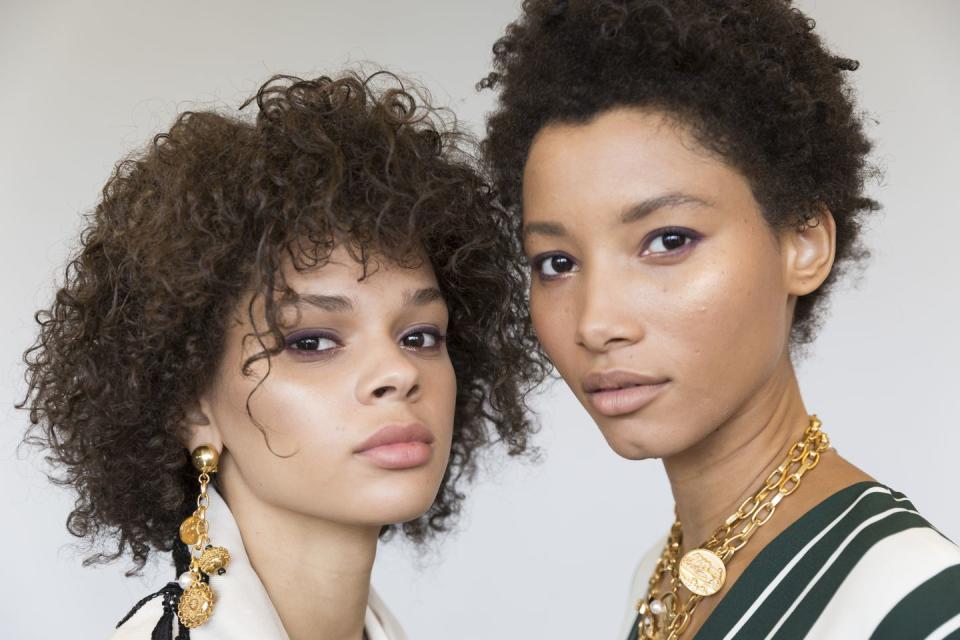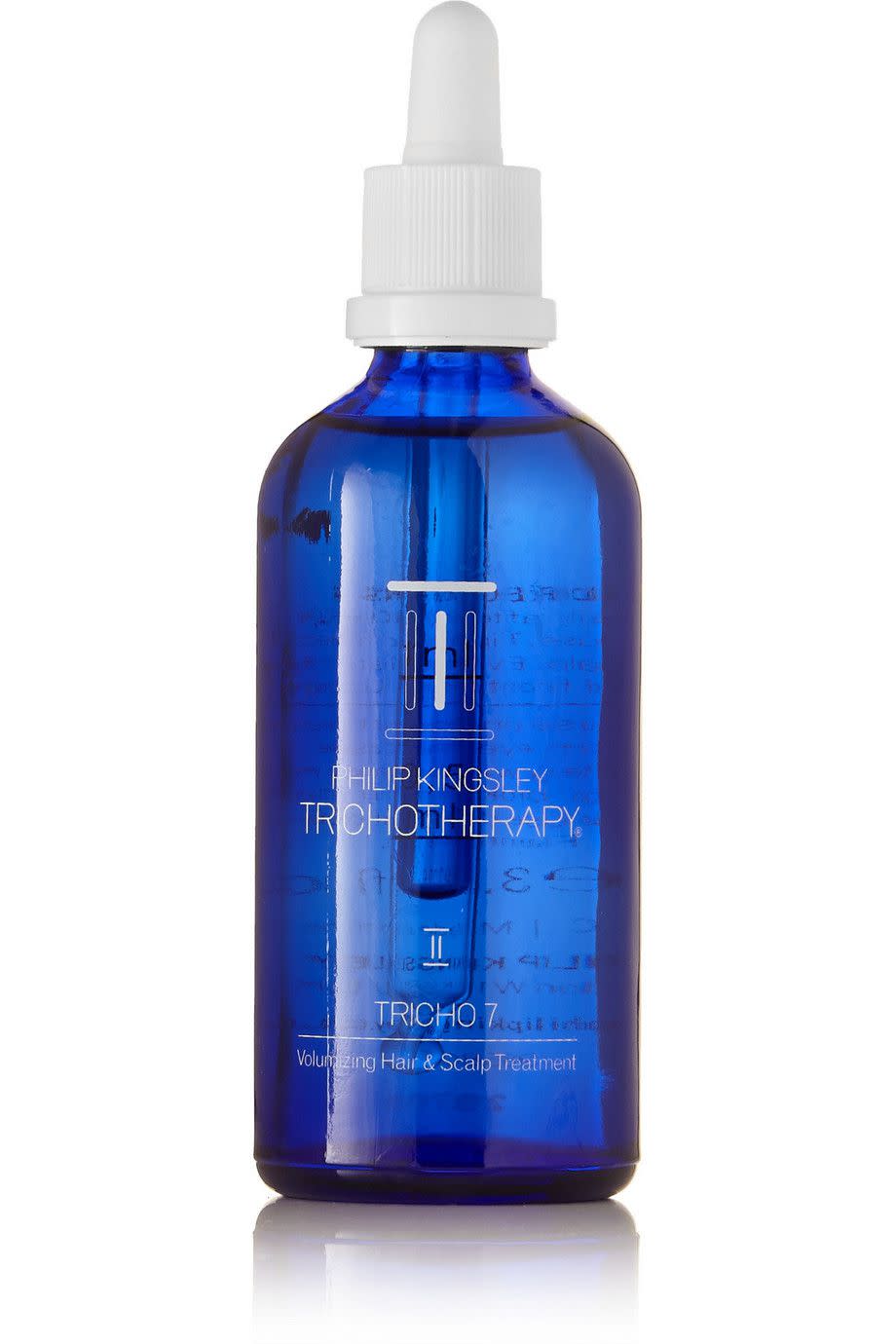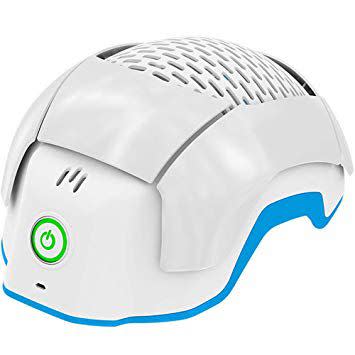The Truth About Hair Loss Treatments - Dependable Or Dupery?

Between unwanted browser pop ups, the dodgy tube ads and the DIY cures peddled by Google, when it comes to hair loss, it can feel like there's more dubious advice out there than Goop's Wellness tab.
But with more and more women experiencing some kind of significant hair loss in their lifetime, it's more necessary than ever to sort the effective cures, from the fakery.
The *add to basket* versus the BS, if you will.
Which hair loss treatments actually work? And can hair growth shampoos really make a difference? We quizzed pro trichologists Anabel Kingsley and Sally-Ann Tarver to bring you the legit advice worth bookmarking.

'Nutritional deficiencies, stress, illness, medications, genetic factors, hormonal changes and imbalances are some of the most common causes of hair loss,' says Tarver.
'The causes differ slightly depending on a woman’s age - younger women tend to suffer with low iron or nutritionally related hair loss, as well as hair which does not appear to recover after childbirth.
'Younger women who have developed Polycystic Ovarian Syndrome (PCOS) may suffer hair thinning (Androgenic Alopecia) as one of the symptoms of the disorder. Women in their 40s and 50s are also prone to nutritionally related hair loss but in addition to hormonal issues such as thyroid imbalances,' she continues.
'Genetic (Androgenetic Alopecia) hair loss tends to become more apparent after the menopause following a drop in oestrogen levels. Hair loss due to stress, illness or surgery can affect anyone at any age but the loss is exacerbated where there is an additional underlying condition such as low iron or hypothyroidism.'

'Any topical treatment must be applied daily in order for it to work. It is important to realise that treating hair loss it isn’t simply about the application of topical products,' says Kingsley.
'You must take a holistic approach when addressing any hair loss issue. This involves optimising nutrition and general health, keeping stress levels under-control, and strengthening the condition of your hair with weekly moisturising treatments.
'It is also important to note that the effectiveness of a product it is not just reliant on the ingredients contained. It is heavily dependent on the concentrations of the ingredients, the quality of them and how they are formulated into the product.'
Scalp Drops
'For androgenic alopecia, whereby hair follicles on the scalp are sensitive to normal levels of circulating androgens, topical anti-androgenic scalp drops can be very beneficial. I recommend our Tricho 7 Scalp Drops. They contain stimulating Methyl Nicotinate (a vaso-dilator), and a combination of Zinc Sulphate, Azelaic Acid and Vitamin B16 to help protect hair follicles from the effects of male hormones.'
Philip Kingsley Tricho 7 Scalp Drops - £50 BUY

Lotions
'There is a plethora of lotions for hair loss on the market, pharmaceutical and alternative. Some are more effective than others, some are very user friendly needing only to be applied once daily or every other day, others less so.
'Regaine is the most well-known pharmaceutical treatment for hair loss on the market, but must be used twice a day to see any benefits. It is indicated for Female Pattern Baldness rather than for enhancing the speed of growth. It will have no effect on general hair shedding due to other causes and has a very small risk of side effects.'
Regaine Hair Loss Treatment For Women - SHOP NOW

Laser Phototherapy
'This was once only available to those that had a high disposable income and could afford to visit a clinic and sit under a £40,000 machine to boost hair growth. Home laser therapy machines are affordable and some are as effective as the clinic machines. Laser Phototherapy stimulates microcirculation, oxygen and nutrients to the hair follicle.
'It can help stimulate dormant hair follicles which may not have re-entered the growth phase as well as improving the health and quality of existing hairs. It has been proven to have a stimulatory, therapeutic effect on human hair due to increased blood flow, oxygenation and keratin production. Wearable home laser therapy devices such as the Theradome LH80 PRO Laser Helmet are easy to use, take little effort and are equally effective as a clinical treatment, if not more so, as they can be used more frequently than clinic visits would permit.'
Theradome LH80 PRO Laser Helmet - £749 BUY

Supplements
'Supplements can help to boost hair growth if they contain a balance of the right nutrients that you happen to be deficient in. For example if you are not deficient in Biotin then supplementing with more Biotin will have little effect on your hair.
'Some of the most common deficiencies, which cause slow growing weak hair are iron, zinc, magnesium, Vitamin B12, Vitamin D although it’s best to get a blood test to find out what you actually need and how much rather than just taking large doses of each.'
'Shampoos will not treat a hair loss issue, such as androgenic alopecia. This is because they are not left on the scalp long enough to have a lasting effect on the hair follicle,' explains Anabel. 'I would not recommend purchasing a shampoo that is marketed as a "hair growth shampoo", as this is very misleading.
'However, volumising shampoos can be very beneficial for people with fine or thinning hair as they add immediate volume – and this, very importantly, gives a psychological boost. Look for ingredients such as thickening proteins, which will add immediate bulk to strands.
'That said, frequent shampooing is important to hair growth. This is because it helps to keep the scalp environment clean and in good condition – and a healthy scalp encourages the growth of healthy strands. A flaky scalp can cause hair loss, so it is important to keep your scalp clear. If you have a scaly scalp, look for a shampoo that is specifically geared towards clearing flaking and itching.'
('You Might Also Like',)

